Roller Hearth Furnace


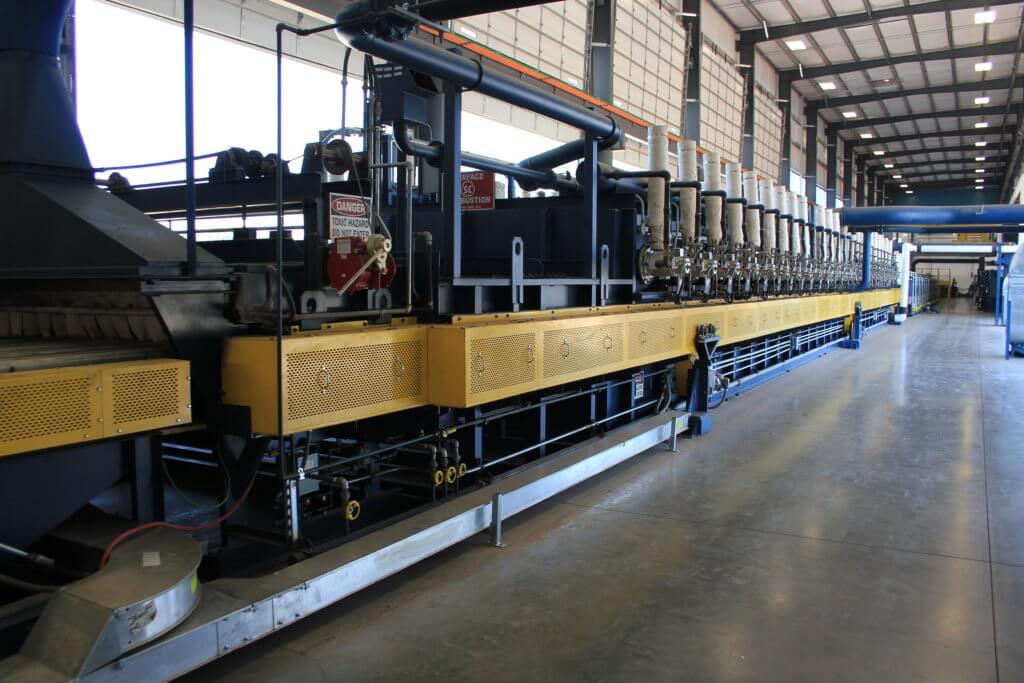
Roller Hearth Furnace
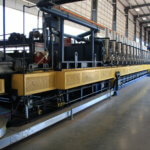
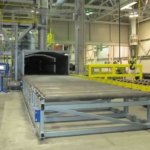
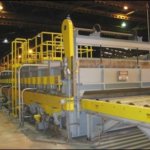
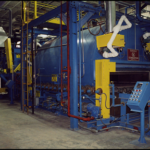
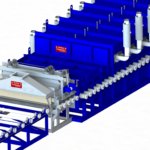
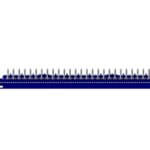
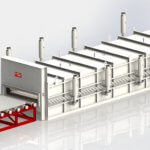
When you look to purchase anything in life, you always feel more comfortable when you go to the experts. Surface Combustion has more than 100 years of experience with thermal systems. Roller hearth furnaces are used for long product like pipes, tubes and bars and for heavier loading of product in baskets. Within the roller hearth furnace style, product is placed on the rolls in many fashions. Tube, pipe and bars incorporate laydown tables and lift and carry mechanisms. Basket loaded product is lifted onto base trays. The rollers on the charge tables and within the furnace are integrally driven in unison to move the load through the furnace. The discharge end can include slow cooling sections, quench tanks or discharge through and exit vestibule into an air environment.
Surface® Combustion’s roller hearth furnaces start with an insulated hot zone typically include a bricked floor and walls and a fiber lined roof. The heating source can be direct or indirect gas fired or electric elements. For those products requiring an internal atmosphere, only indirect gas firing and electric heating may be used. Endothermic atmosphere furnace, using RX®, gas or exothermic atmosphere furnace, using DX®, gas forms the base combination necessary for through hardening, carburizing, annealing, or normalizing. The rolls are a high-grade alloy construction. Roll drives are electrical motor driven via zone drives which are synchronized and appropriately clutched. These are continuous style furnaces, so products enter and exit through opposite ends. At the exit, an oil, polymer or water quench can be incorporated for the hardening process. For annealing or normalizing, a long atmosphere cooling chamber is used to slowly cool the load and minimize distortion. Traditional and boost diffuse carburizing–where zone separation is necessary for different process step temperatures or carbon potentials–can be performed in this type of furnace. Typical widths are 3 to 6 ft. but can be engineered to meet the required specifications for the customer’s product. This furnace style has no limitation on length. The operating range of higher temperature furnaces is typically 1400°F to 2000°F as this is a radiant/conduction style of heat transfer to the load. Lower temperature styles for tempering or stress relieving are 350°F to 1400°F and typically incorporate convection fans.
Special run in and run out clutching is necessary to minimize any gaps in loading when running long product in a roller hearth furnace. Sensors are used to allow the gaps to be closed once the incoming load has reached a certain point in the furnace. Entry and exit vestibules and separation curtains along with techniques to individually adjust the vestibule height for the specific product are employed to minimize atmosphere usage. Slow cooling zones use a combination of insulated and water-cooled walls and rolls to extract heat to minimize distortion. If quenching is required, agitation can be via pumps and nozzles or propeller agitation with full shrouding. The oil can be heated via electric bayonet style heating elements and is cooled after quenching to return the oil temperature to the setpoint.
Ceramic Fiber or Brick insulating systems
Maximum operating temperatures up to 2200°F
Electric, direct gas fired (recuperative and regenerative) and radiant tube systems available
Alloy, steel or ceramic roller hearth systems
Controls meeting the requirements of AMS-2750 or CQI-9 can be provided as requested
Self-emptying design
Proprietary VF™ fan extends fan life by minimizing vibration and gives uniform atmosphere distribution
Aging
Annealing
Bluing
Bright Annealing
Carbon Restoration
Carbonitriding
Carburizing
Ferritic Nitrocarburizing (FNC)
Hardening
Homogenizing
Normalizing
Reheating
Solutionizing
Stress Relieving
Temper
Partial processes list shown. Looking for something specfic, contact us.
Agricultural
Automotive
Energy
Fasteners
Firearms and Firearms Components
Gears
Government Furnace Supplier
Hydraulic
Oil & Gas
Structural Shapes
Trucking/Bus/Rail
Partial industries list shown. Looking for something specfic, contact us.
Aerospace Components
Aluminum
Bearings
Cast Iron
Casting
Coil
Forgings
Munitions
Pipe
Plates
Rod & Bar
Rod Coil
Slabs
Stainless Steels
Steel
Titanium
Tube
Wire
Partial material and component list shown. Looking for something specfic, contact us.
Atmosphere Generator
Load/Unload Tables
Atmosphere Cooling Systems
Partial companion equipment list shown. Looking for something specfic, contact us.
Surface® is Your Source
CONTACT US TODAY, and let us show you the Value of Surface™
Ready to Get Started?
Please call us when you are ready to discuss a new furnace or maintain, upgrade or replace your furnace or any part of your furnace. At Surface, we look forward to helping you with any thermal processing needs.
Call Surface with the following information ready to initiate your furnace solution.
cycle
operation
hours per year
available space
operating temperature range
heat source
Give Us a Call